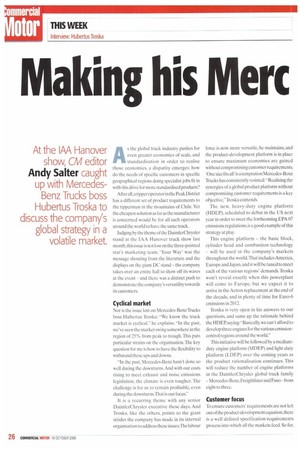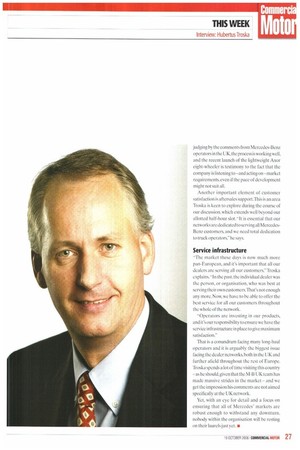Making his Men
Page 26

Page 27

If you've noticed an error in this article please click here to report it so we can fix it.
At the IM Hanover show, CM editor Andy Salter caught up with Mercedes Benz Trucks boss Hubertus Troska to discuss the company's global strategy in a
volatile market. the global truck industry pushes for even greater economies of scale, and standardisation in order to realise
those economies, a disparity emerges: how do the needs of specific customers in specific geographical regions doing specialist jobs fit in with this drive for more standardised products?
After all,a tipperoperatorin the Peak District has a different set of product requirements to the tipperman in the mountains of Chile. Yet the cheapest solution as far as the manufacturer is concerned would be ibr all such operators around the world to have the same truck.
Judging by the theme of the DaimlerChrysler stand at the IAA Hanover truck show last month, this issue is not lost on the three-pointed star's marketing team. 'Your Way' was the message shouting from the literature and the displays on the giant DC stand the company takes over an entire hall to show off its wares at the event and there was a distinct push to demonstrate the company's versatility towards its customers.
Cyclical market
Nor is the issue lost on Mercedes-Benz Trucks boss Hubertus Troska: "We know the truck market is cyclical," he explains. -In the past, we've seen the market swing somewhere in the region of 25% from peak to trough. This puts particular strains on the organisation. The key question for me is how to have the flexibility to withstand these ups and downs.
-In the past. Mercedes-Benz hasn't done so well during the downturns. And with our costs rising to meet exhaust and noise emissions legislation, the climate is even tougher. The challenge is for us to remain profitable. even during the downturns.That is our focus." It is a recurring theme with any senior DaimlerChrysler executive these days. And Troska, like the others, points to the giant strides the company has made in its internal organisation to address these issues.The labour
force is now more versatile, he maintains, and the product-development platform is in place to ensure maximum economies are gained without compromising customer requirements. 'One size fits all' is a temptation Mercedes-Benz Trucks has consistently resisted: "Realising the synergies of a global product platform without compromising customer requirements is a key objective,"Troska contends.
The new, heavy-duty engine platform (HDEP), scheduled to debut in the US next year in order to meet the forthcoming EPA 07 emissions regulations, is a good example of this strategy at play.
This engine platform the basic block, cylinder head and combustion technology will be used in the company's markets throughout the world.That includes America, Europe and Japan, and it will be tuned to meet each of the various regions' demands. Troska won't reveal exactly when this powerplant will come to Europe, but we expect it to arrive in the Actros replacement at the end of the decade, and in plenty of time for Euro-6 emissions in 2012.
Troska is very open in his answers to our questions, and sums up the rationale behind the HDEP,saying:"Basically,we can't afford to develop three engines for the various emissioncontrol regions around the world."
This initiative will be followed by a mediumduty engine platform (MDEP) and light-duty platform (LDEP) over the coming years as the product rationalisation continues. This will reduce the number of engine platforms in the DaimlerChrysler global truck family -Mercedes-Benz. Freightliner and Fuso from eight to three.
Customer focus
To ensure customers' requirements are not left out of the product-development equation,there is a well defined specification-requirements process into which all the markets feed. So far, judging by the comments from Mercedes-Benz operators in the UK,the process is working well, and the recent launch of the lightweight Axor eight-wheeler is testimony to the fact that the
company is listening to acting on requirements, even if the pace of development might not suit all.
Another important element of customer satisfaction is aftersales support.This is an area Troska is keen to explore during the course of our discussion, which extends well beyond our allotted half-hour slot. "It is essential that our networks are dedicated to serving all MercedesBenz customers, and we need total dedication to truck operators," he says.
Service infrastructure
The market these days is now much more pan-European, and it's important that all our dealers are serving all our customers," Troska explains. "In the past, the individual dealer was the person, or organisation, who was best at serving their own customers. That's not enough any more. Now, we have to be able to offer the best service for all our customers throughout the whole of the network.
"Operators are investing in our products, and it's our responsibility to ensure we have the service infrastructure in place to give maximum satisfaction."
That is a conundrum facing many long-haul operators and it is arguably the biggest issue facing the dealer networks, both in the UK and further afield throughout the rest of Europe. Troska spends a lot of time visiting this country —as he should,given that the M-B UK team has made massive strides in the market — and we get the impression his comments are not aimed specifically at the UK network. Yet, with an eye for detail and a focus on ensuring that all of Mercedes' markets are robust enough to withstand any downturn, nobody within the organisation will be resting on their laurels j ust yet. •


























































































































































































